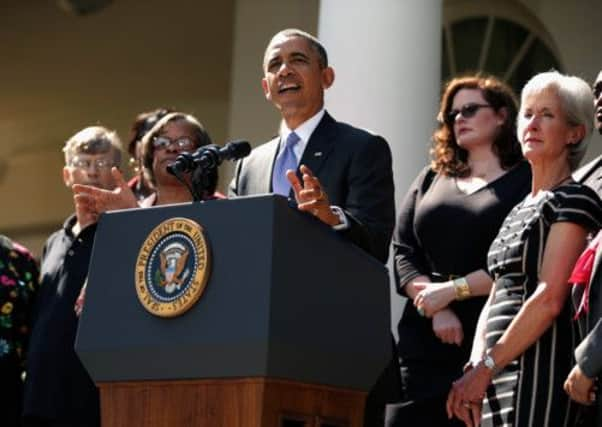US brought grinding to halt by political rancour


With neither side appearing willing to back down, many parts of the federal government put up “closed for business” signs and more than 800,000 workers were told to stay at home. Analysts said the indefinite shutdown, the first in 17 years, would cost the US economy about $1 billion (£618 million) per week.
There were also fears that the economic fallout would reach beyond the US borders, with Prime Minister David Cameron using the crisis to warn that Britain needed to tackle its own burgeoning debt problems.
Advertisement
Hide AdAdvertisement
Hide Ad“It is a reminder to all of us that we need to have properly planned public expenditure systems, properly planned tax, properly planned arrangements for getting our deficit down,” he said at the Conservative Party conference in Manchester.
“Some people want to get away from the subject of deficit reduction and sorting our economy out. But I think we will see lots of reminders over the coming months, like what is happening in America, that it is absolutely vital that we grip it.”
Mr Obama defended his healthcare reforms in a televised address to the nation yesterday, and launched a stinging attack on the Republican leadership.
“Contrary to Republican claims, this law hasn’t destroyed our economy,” he said. “The irony is that they’ve shut down a whole bunch of parts of government but the Affordable Care Act is still open for business.
“Nobody gets to hurt our economy and millions of hard-working families over a law you don’t like. My message to Congress is this: pass a budget, end the government shutdown, pay your bills, prevent an economic shutdown. Don’t put our economy or our people through this any longer.”
Only workers deemed essential to the running of the US government were required to work yesterday, leading to the mass closure of national parks, tourist attractions such as the Statue of Liberty and even the government-funded Pandacam at Washington’s National Zoo, which had been following the progress of a month-old cub.
Nasa was also forced to shut down the Mars Curiosity Rover exploration vehicle. The military was unaffected and active service personnel will continue to be paid after Congress agreed an emergency measure late on Monday. Other “essential” federal workers such as air traffic controllers, 200,000 Homeland Security staff and Nasa commanders overseeing the International Space Station must still report for duty, but may not be paid until the crisis is over. The vast majority of government departments either closed completely or were operating emergency services only.
Leaders of the Republican and Democratic parties in Washington were in no mood to compromise over setting a budget as they continued to bicker over Obamacare.
Advertisement
Hide AdAdvertisement
Hide AdWhile the funding of Mr Obama’s reforms is not directly related to the federal budget, the Republican-controlled House of Representatives wants a spending plan with a provision to delay Obamacare by a year or scrap it completely. The majority Democrat Senate supports the president, and in a vote at lunchtime yesterday rejected a House bill with the proviso for the fourth time.
“We will not go to conference with a gun to our heads,” Harry Reid, the Senate majority leader, said yesterday in response to an offer from senior House members to negotiate.
The Republicans, he claimed, were “fixated on embarrassing our president” and he added that he would not appoint negotiators until the House agreed to pass a bill guaranteeing government funding for six weeks and also withdrew its insistence that Obamacare be delayed.
His rivals accused him and his colleagues of placing obstacles in the way of a resolution. “I heard Harry Reid on the floor saying he didn’t want to sit down and discuss things or resolve it. I just think that’s unacceptable to the American people,” said Republican Congressman Eric Cantor, the House majority leader.
All 533 members of Congress, meanwhile, will continue to be paid, regardless of how long the shutdown lasts. The most recent, and longest closure in US history was 21 days during Bill Clinton’s presidency, from December 1995 to January 1996.